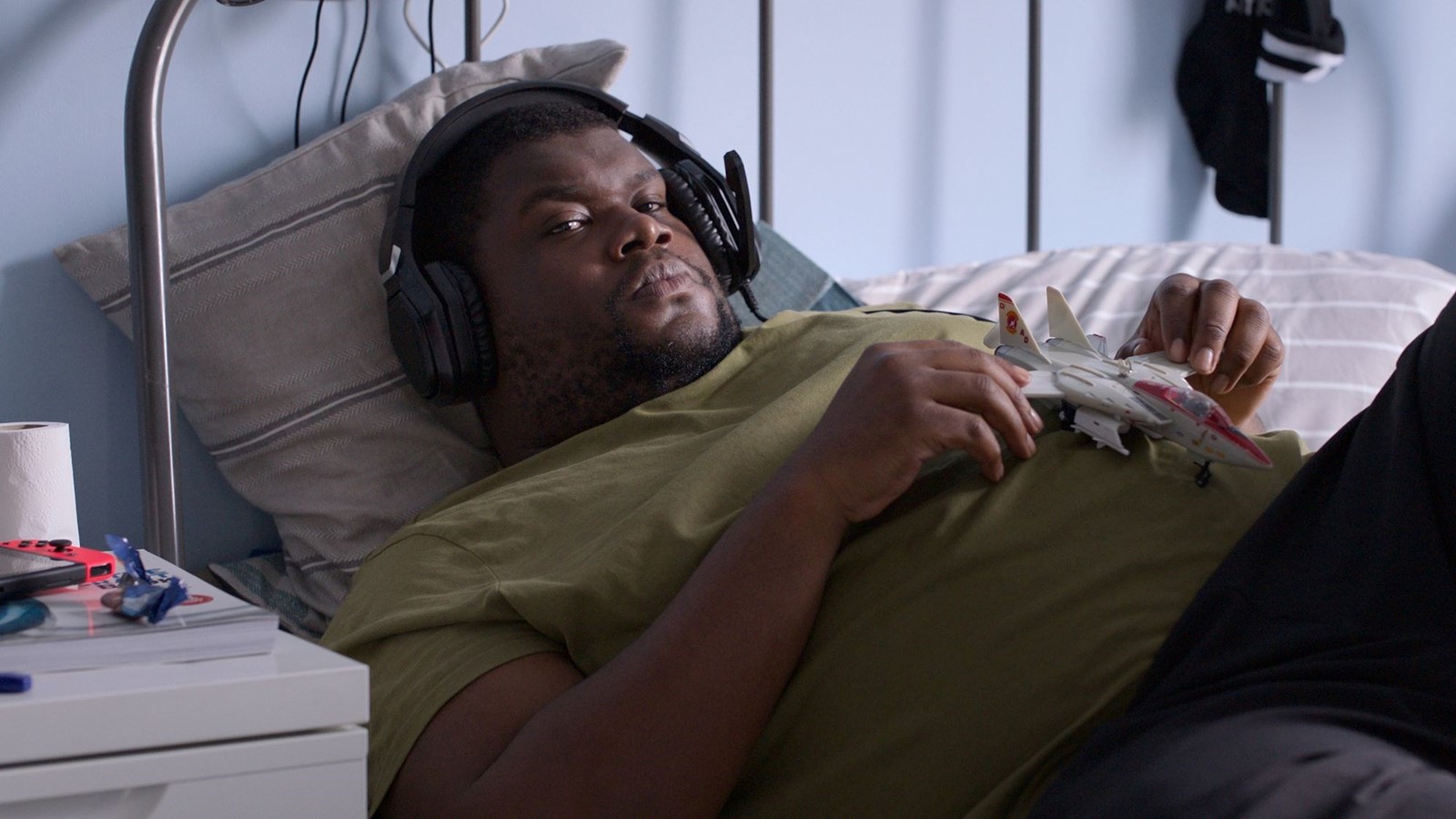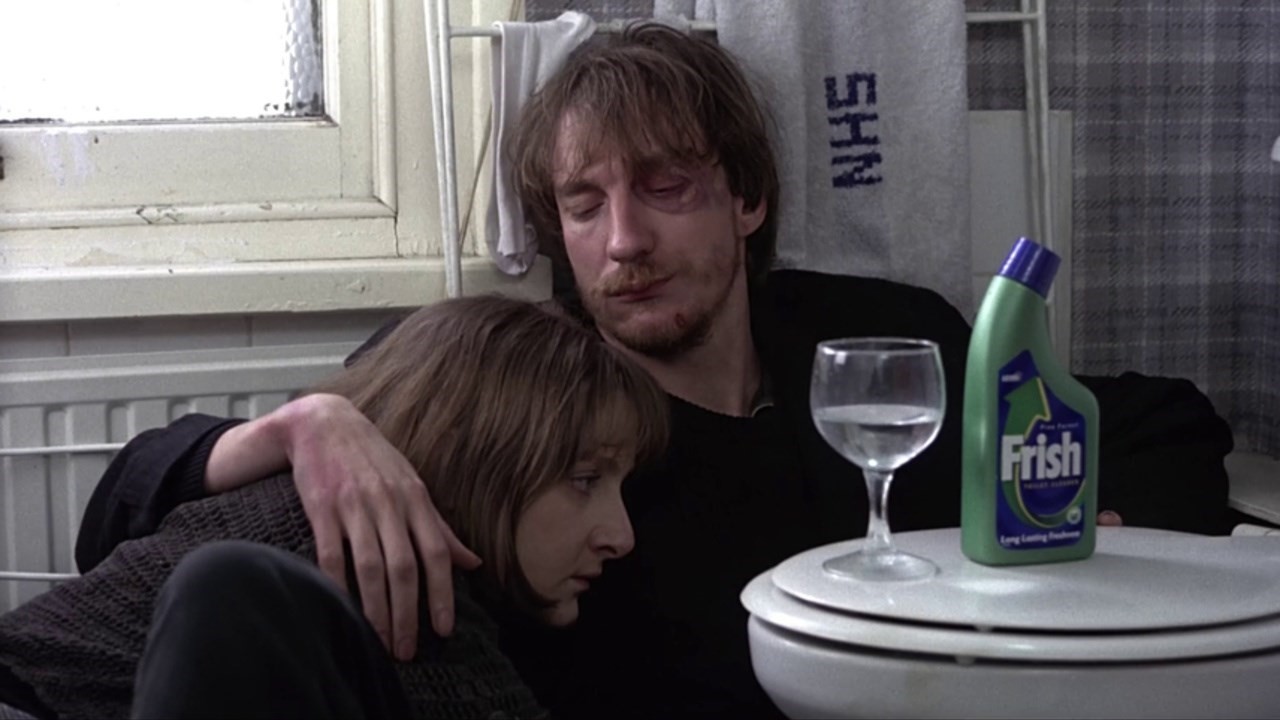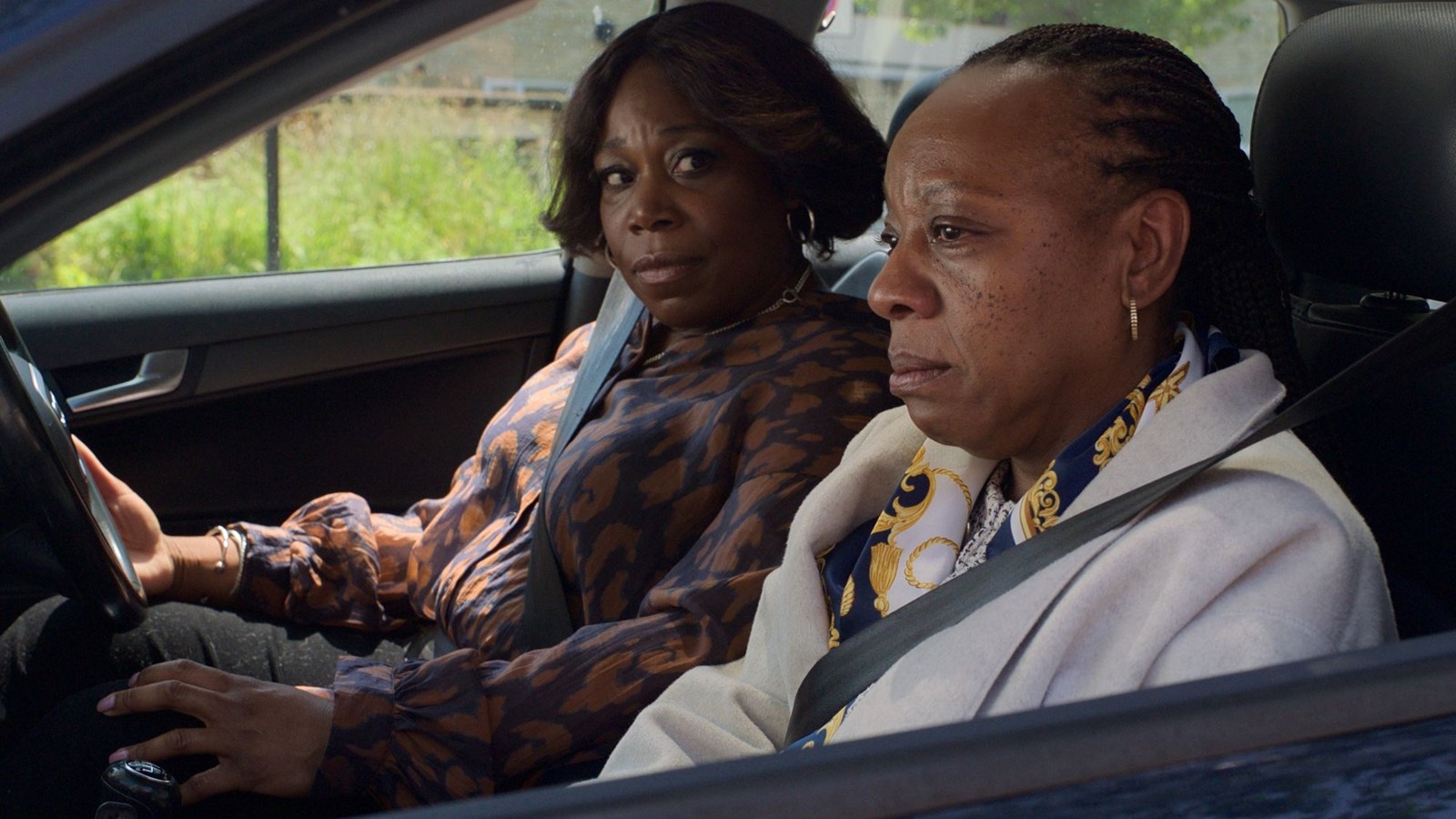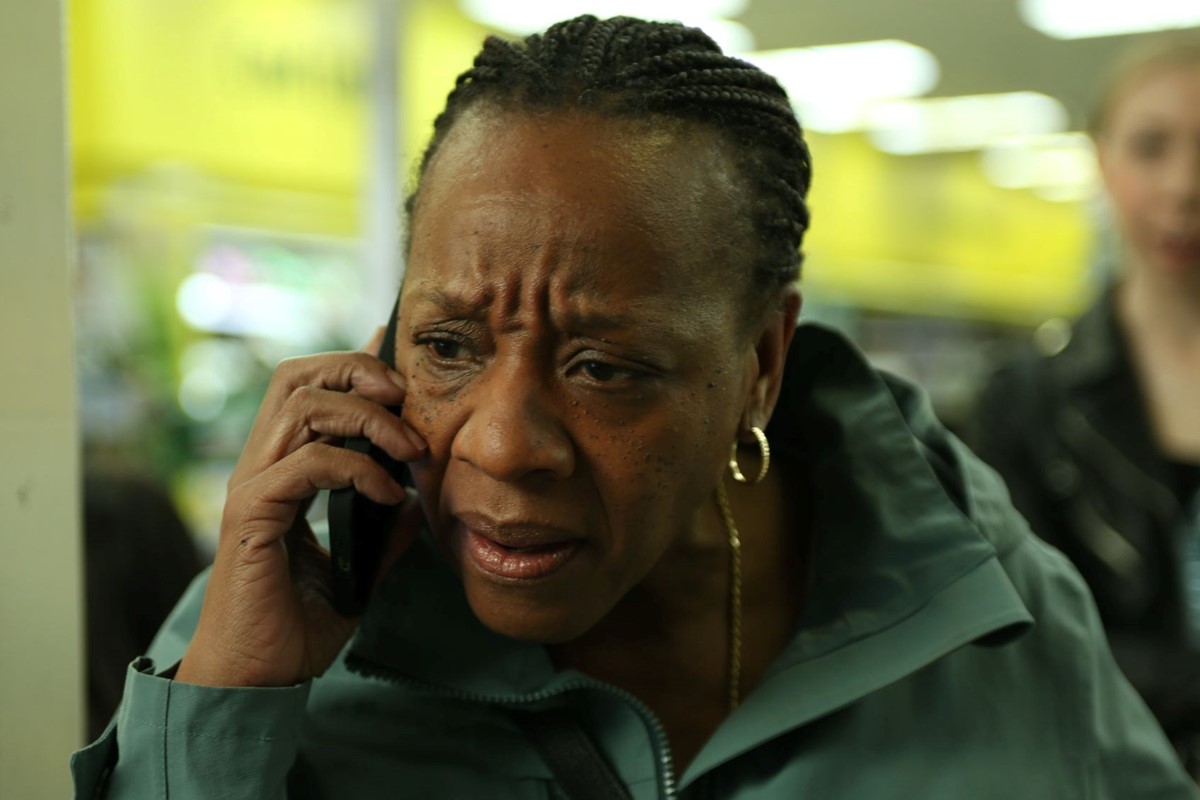Rewrite
Lead ImageHard Truths, 2025(Film still)
When Rob Brydon roared, “Secrets and lies, Gwen, secrets and lies!” in the final episode of Gavin and Stacey this Christmas, he merely confirmed what those in the know, know: that Mike Leigh is the absolute goat when it comes to a certain strain of British character comedy.
On the face of it, Ruth Jones and James Corden’s much-loved sitcom is a far cry from Hard Truths, the 81-year-old veteran of film, theatre and television’s hard-hitting new drama. But perhaps no one has done more to explore the contours of British working- and middle-class life over the past 50 years than Leigh, and his unique comic voice – steeped in feeling for the odd cadences of everyday speech – can be felt in generations of writers, from Caroline Aherne and Ricky Gervais to Corden and Jones. Leigh says he watched the series finale “with glee” at home with his family – he has two sons by his ex-wife and collaborator, Alison Steadman, who played Pam in the show – and “howled” at Brydon’s nod to the film. “It was funny and moving … the whole thing was an absolute delight.”

Reuniting Leigh with the Oscar-winning star of Secrets & Lies (1996), the great Marianne Jean-Baptiste, Hard Truths is an abrasive and darkly funny affair about a highly neurotic south London matriarch who terrorises her own family while struggling to set foot outside the front door. When the fifth anniversary of her mum’s death approaches, Pansy’s long-suffering sister, Chantelle (Michele Austin, another Secrets & Lies alum), reaches out in hopes of breaking down her defences – and Pansy is forced to reckon with the string of broken relationships around her.
It’s a tough watch, sweetened as always in Leigh’s work by pitch-perfect performances and a spectacular volley of scathing one-liners from Pansy. (Getting into a row with a man in a carpark, she tells him, “Your balls are so backed up your brain’s full of sperm!”) Its themes of intolerance and social isolation suggested, to me, the lingering spectre of Covid, but Leigh says the pandemic never even figured in his thinking. “I’ve never really thought about it being a post-Covid film any more than I think about it being a post-Brexit film, which some people have picked up on,” he says. “Some people have said, well, obviously Pansy would have been stuck in the house [during Covid]. But I think someone in Pansy’s condition would have been stuck in the house anyway. It’s anyone’s prerogative to speculate, but for me, her condition is an endemic problem. I mean, don’t tell me you don’t know someone that Pansy reminds you of exactly.”
“We’re not treating the audience to a comfortable 97 minutes where, like in many movies, you know exactly where you are and what you should feel about it” – Mike Leigh
Reader, I do. Pansy is a black hole of intermingled rage and terror that sits at one polar extreme of the characters Leigh tends to exhibit, who generally fall into one of two camps – the Happy-Go-Lucky, Poppy-types marked by their warmth and curiosity towards people, and the surly types who’ve seemingly soured on life altogether (Naked’s Johnny, Life Is Sweet’s Nicola). Perhaps there’s a bit of both in Leigh, a diminutive but intimidating figure with a rep for being spiky in interviews. Of course, it probably doesn’t help when, wafting into a central London hotel room one afternoon in October, I start by asking him when the film will have its premiere at London Film Festival. Leigh stares at me, incredulous. “It was last night,” he says, as if about to call security.
Not the greatest of starts. And there’s more to come. I ask him if there’s a danger with a character like Pansy that she ends up unbalancing the whole film. “No,” says Leigh. “Well, did you think so? What we try and do with these films, and this one is no exception, is to create three-dimensional, solid, entirely believable characters. There will be people who will find Pansy so objectionable that they might find the whole thing intolerable. But to my astonishment and horror, I discovered that some people found [Sally Hawkins’ eternally upbeat character] Poppy unbearable in Happy Go Lucky. And I found that astonishing because she’s a very compassionate, funny, grounded character. So it may be that there’ll be some people who can’t deal with Pansy, but I would suggest they’re going to be in a minority. And that’s probably more about them than it is about Pansy.”

Leigh and Jean-Baptiste had been discussing the possibility of working on a new film together for years, says the director, “and eventually we did, simple as that. I mean, knowing her as I do, she’s a consummate character actor. She’s got a great sense of life, a great sense of humour, and it just seemed right to get down to it and create a character with her.” Jean-Baptiste’s performance dominates the film, her tearful stammering of the word “haunted” in one graveyard scene – a moment that seemingly comes out of nowhere – laying bare the character’s pain in one inspired stroke.
One of the great myths about his work, says Leigh, is to assume that moments like these are being improvised in front of our eyes. In fact, they’re the product of months of rehearsals and character workshopping through which the finished film, which is always “very precise”, emerges. “I could never sit in a room and write [a scene] like that,” says Leigh, who recalls the moment coming as a surprise even to Jean-Baptiste. “I think this kind of creative process that we embark on is full of surprises in that sense. And that’s what feels rich about doing it, to capture those moments so we can share them with the audience is what it’s all about.”
While Leigh’s collaborative process has repeatedly drawn career-best performances from his actors, it also makes it harder in today’s world of high-concept loglines for him to find backing. “What happens with my films is I say to backers, ‘We can’t tell you anything about [the project] because we don’t know what it is yet, we can’t tell you the cast and you can’t interfere [with it].’ Which means that most backers tell you to get lost,” says Leigh, adding that one project he pitched to the BBC less than two years ago was rejected on exactly those grounds. “And somehow, partly because of streamers and all that, who like to know what they’re getting so they can control it, it’s become harder to get the backing. [So] am I mentally giving two fingers to the people that told me to get lost? Yes.”

The era in which Leigh got his break seems a world away now. He trained as an actor at Rada but quickly lost interest, moving into theatre before making a name for himself with television plays like Abigail’s Party and Nuts in May, both produced for the Play for Today series that showcased early work by the likes of Ken Loach, Dennis Potter, Stephen Frears and Alan Clarke. The freedom he found here was “fantastic”, says Leigh, and simply “doesn’t exist any more” in the industry, paving the way for critical and commercial successes like Meantime, Life Is Sweet and the scathing Naked. (It’s a curious fact, given the specificities of his generally British-set stories, that Leigh seems to have won admirers in a younger generation of American filmmakers, including Sean Baker, the Safdie brothers and Kelly Reichardt.)
By contrast, says Leigh, young dramatists today have far less freedom to explore. “I know young filmmakers and there’s no question I was not subjected to some of the bullshit [they get] about box-ticking,” he says. “I know one who had worked a lot with a [male] cinematographer; he went for a meeting and was asked, ‘Why isn’t your cinematographer a woman?’ And he said, ‘Well, because he’s a man.’ And I mean, of course that’s part of a very healthy [process] because there are many more women cinematographers and film directors now and that’s good, but it’s the box-ticking and the reliance on algorithms to decide what audiences want to see that would have scuppered me. There’s no question it would have been [harder].”
Hard Truths’ other dramatic set piece comes in a scene where Pansy starts sobbing uncontrollably at her sister’s dinner table, and the family just freezes, unwilling or unable to comfort her. It makes for an instructive comparison with Secrets & Lies, where a famous scene of family bloodletting – parodied in Gavin & Stacey – leads to catharsis and, ultimately, one of the happiest endings of Leigh’s career. No such catharsis seems possible here, a fact that speaks to the entrenched isolation of our times. But Leigh will always insist on his characters’ humanity.
“Most people I talk to say that, in the end, they feel sympathetic towards [Pansy],” says the director. “But what’s for sure is, we’re not treating the audience to a comfortable 97 minutes where, like in many movies, you know exactly where you are and what you should feel about it. It’s complex, it’s contradictory, it’s confrontational, it’s funny and it’s tragic. And in the end, the important thing is that everybody reacts to it, however they react to it.”
Hard Truths is out in UK cinemas now.
in HTML format, including tags, to make it appealing and easy to read for Japanese-speaking readers aged 20 to 40 interested in fashion. Organize the content with appropriate headings and subheadings (h1, h2, h3, h4, h5, h6), translating all text, including headings, into Japanese. Retain any existing
tags from
Lead ImageHard Truths, 2025(Film still)
When Rob Brydon roared, “Secrets and lies, Gwen, secrets and lies!” in the final episode of Gavin and Stacey this Christmas, he merely confirmed what those in the know, know: that Mike Leigh is the absolute goat when it comes to a certain strain of British character comedy.
On the face of it, Ruth Jones and James Corden’s much-loved sitcom is a far cry from Hard Truths, the 81-year-old veteran of film, theatre and television’s hard-hitting new drama. But perhaps no one has done more to explore the contours of British working- and middle-class life over the past 50 years than Leigh, and his unique comic voice – steeped in feeling for the odd cadences of everyday speech – can be felt in generations of writers, from Caroline Aherne and Ricky Gervais to Corden and Jones. Leigh says he watched the series finale “with glee” at home with his family – he has two sons by his ex-wife and collaborator, Alison Steadman, who played Pam in the show – and “howled” at Brydon’s nod to the film. “It was funny and moving … the whole thing was an absolute delight.”

Reuniting Leigh with the Oscar-winning star of Secrets & Lies (1996), the great Marianne Jean-Baptiste, Hard Truths is an abrasive and darkly funny affair about a highly neurotic south London matriarch who terrorises her own family while struggling to set foot outside the front door. When the fifth anniversary of her mum’s death approaches, Pansy’s long-suffering sister, Chantelle (Michele Austin, another Secrets & Lies alum), reaches out in hopes of breaking down her defences – and Pansy is forced to reckon with the string of broken relationships around her.
It’s a tough watch, sweetened as always in Leigh’s work by pitch-perfect performances and a spectacular volley of scathing one-liners from Pansy. (Getting into a row with a man in a carpark, she tells him, “Your balls are so backed up your brain’s full of sperm!”) Its themes of intolerance and social isolation suggested, to me, the lingering spectre of Covid, but Leigh says the pandemic never even figured in his thinking. “I’ve never really thought about it being a post-Covid film any more than I think about it being a post-Brexit film, which some people have picked up on,” he says. “Some people have said, well, obviously Pansy would have been stuck in the house [during Covid]. But I think someone in Pansy’s condition would have been stuck in the house anyway. It’s anyone’s prerogative to speculate, but for me, her condition is an endemic problem. I mean, don’t tell me you don’t know someone that Pansy reminds you of exactly.”
“We’re not treating the audience to a comfortable 97 minutes where, like in many movies, you know exactly where you are and what you should feel about it” – Mike Leigh
Reader, I do. Pansy is a black hole of intermingled rage and terror that sits at one polar extreme of the characters Leigh tends to exhibit, who generally fall into one of two camps – the Happy-Go-Lucky, Poppy-types marked by their warmth and curiosity towards people, and the surly types who’ve seemingly soured on life altogether (Naked’s Johnny, Life Is Sweet’s Nicola). Perhaps there’s a bit of both in Leigh, a diminutive but intimidating figure with a rep for being spiky in interviews. Of course, it probably doesn’t help when, wafting into a central London hotel room one afternoon in October, I start by asking him when the film will have its premiere at London Film Festival. Leigh stares at me, incredulous. “It was last night,” he says, as if about to call security.
Not the greatest of starts. And there’s more to come. I ask him if there’s a danger with a character like Pansy that she ends up unbalancing the whole film. “No,” says Leigh. “Well, did you think so? What we try and do with these films, and this one is no exception, is to create three-dimensional, solid, entirely believable characters. There will be people who will find Pansy so objectionable that they might find the whole thing intolerable. But to my astonishment and horror, I discovered that some people found [Sally Hawkins’ eternally upbeat character] Poppy unbearable in Happy Go Lucky. And I found that astonishing because she’s a very compassionate, funny, grounded character. So it may be that there’ll be some people who can’t deal with Pansy, but I would suggest they’re going to be in a minority. And that’s probably more about them than it is about Pansy.”

Leigh and Jean-Baptiste had been discussing the possibility of working on a new film together for years, says the director, “and eventually we did, simple as that. I mean, knowing her as I do, she’s a consummate character actor. She’s got a great sense of life, a great sense of humour, and it just seemed right to get down to it and create a character with her.” Jean-Baptiste’s performance dominates the film, her tearful stammering of the word “haunted” in one graveyard scene – a moment that seemingly comes out of nowhere – laying bare the character’s pain in one inspired stroke.
One of the great myths about his work, says Leigh, is to assume that moments like these are being improvised in front of our eyes. In fact, they’re the product of months of rehearsals and character workshopping through which the finished film, which is always “very precise”, emerges. “I could never sit in a room and write [a scene] like that,” says Leigh, who recalls the moment coming as a surprise even to Jean-Baptiste. “I think this kind of creative process that we embark on is full of surprises in that sense. And that’s what feels rich about doing it, to capture those moments so we can share them with the audience is what it’s all about.”
While Leigh’s collaborative process has repeatedly drawn career-best performances from his actors, it also makes it harder in today’s world of high-concept loglines for him to find backing. “What happens with my films is I say to backers, ‘We can’t tell you anything about [the project] because we don’t know what it is yet, we can’t tell you the cast and you can’t interfere [with it].’ Which means that most backers tell you to get lost,” says Leigh, adding that one project he pitched to the BBC less than two years ago was rejected on exactly those grounds. “And somehow, partly because of streamers and all that, who like to know what they’re getting so they can control it, it’s become harder to get the backing. [So] am I mentally giving two fingers to the people that told me to get lost? Yes.”

The era in which Leigh got his break seems a world away now. He trained as an actor at Rada but quickly lost interest, moving into theatre before making a name for himself with television plays like Abigail’s Party and Nuts in May, both produced for the Play for Today series that showcased early work by the likes of Ken Loach, Dennis Potter, Stephen Frears and Alan Clarke. The freedom he found here was “fantastic”, says Leigh, and simply “doesn’t exist any more” in the industry, paving the way for critical and commercial successes like Meantime, Life Is Sweet and the scathing Naked. (It’s a curious fact, given the specificities of his generally British-set stories, that Leigh seems to have won admirers in a younger generation of American filmmakers, including Sean Baker, the Safdie brothers and Kelly Reichardt.)
By contrast, says Leigh, young dramatists today have far less freedom to explore. “I know young filmmakers and there’s no question I was not subjected to some of the bullshit [they get] about box-ticking,” he says. “I know one who had worked a lot with a [male] cinematographer; he went for a meeting and was asked, ‘Why isn’t your cinematographer a woman?’ And he said, ‘Well, because he’s a man.’ And I mean, of course that’s part of a very healthy [process] because there are many more women cinematographers and film directors now and that’s good, but it’s the box-ticking and the reliance on algorithms to decide what audiences want to see that would have scuppered me. There’s no question it would have been [harder].”
Hard Truths’ other dramatic set piece comes in a scene where Pansy starts sobbing uncontrollably at her sister’s dinner table, and the family just freezes, unwilling or unable to comfort her. It makes for an instructive comparison with Secrets & Lies, where a famous scene of family bloodletting – parodied in Gavin & Stacey – leads to catharsis and, ultimately, one of the happiest endings of Leigh’s career. No such catharsis seems possible here, a fact that speaks to the entrenched isolation of our times. But Leigh will always insist on his characters’ humanity.
“Most people I talk to say that, in the end, they feel sympathetic towards [Pansy],” says the director. “But what’s for sure is, we’re not treating the audience to a comfortable 97 minutes where, like in many movies, you know exactly where you are and what you should feel about it. It’s complex, it’s contradictory, it’s confrontational, it’s funny and it’s tragic. And in the end, the important thing is that everybody reacts to it, however they react to it.”
Hard Truths is out in UK cinemas now.
and integrate them seamlessly into the new content without adding new tags. Ensure the new content is fashion-related, written entirely in Japanese, and approximately 1500 words. Conclude with a “結論” section and a well-formatted “よくある質問” section. Avoid including an introduction or a note explaining the process.



